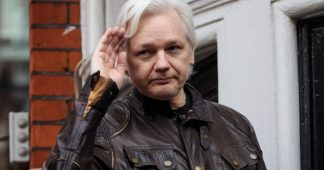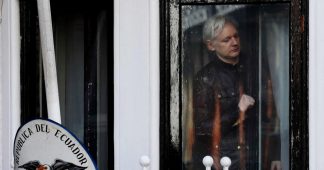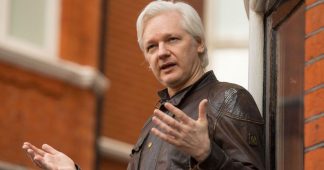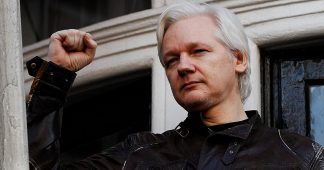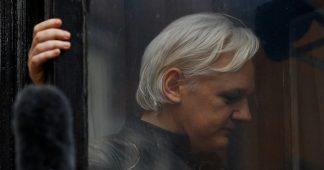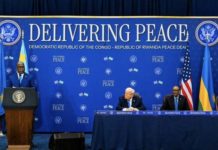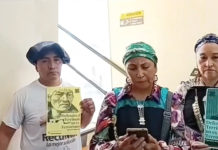An assistant U.S. attorney in the federal Eastern District of Virginia on November 16 accidentally revealed that Wikileaks co-founder Julian Assange has been charged with unspecified federal crimes; those charges have been sealed. The disclosure came in an unrelated terrorism and child pornography case. In response to a media inquiry, the assistant U.S. attorney asked a judge to keep Assange’s charges sealed, saying, “Due to the sophistication of the defendant, and the publicity surrounding the case, no other procedure is likely to keep confidential the fact that Assange has been charged.… The charges need to remain sealed until Assange is arrested.”
There are several aspects to this “accident” that are setting off alarm bells. First, it’s news that Assange has actually been charged with something. The speculation is that the charge is likely to be multiple counts of espionage. The government will argue that Assange is not a journalist and is not entitled to journalistic protections. It will argue further that Assange did exactly what the 1917 Espionage Act describes as espionage: “Providing national defense information to any person not entitled to receive it.” (I have argued over the years that the Espionage Act is so overly broad as to be unconstitutional, although it has not been challenged through the federal system up to the Supreme Court.)
The issue here is that it is highly unusual – unprecedented, even – for a foreign national (Assange is Australian) to be charged with espionage when he did not steal the information. He was simply provided the information, which he then made public. Assange says that he was just a journalist doing his job, and no administration has ever charged a journalist with espionage for doing his job.
Second, this inadvertent disclosure confirmed that Assange has been charged in the Eastern District of Virginia – the so-called “Espionage Court.” That is just what many of us have feared. Remember, no national security defendant has ever been found not guilty in the Eastern District of Virginia. The Eastern District is also known as the “rocket docket” for the swiftness with which cases are heard and decided. Not ready to mount a defense? Need more time? Haven’t received all of your discovery? Tough luck. See you in court.
Third, I have long predicted that Assange would face Judge Leonie Brinkema were he to be charged in the Eastern District. Brinkema handled my case, as well as CIA whistleblower Jeffrey Sterling’s. She also has reserved the Ed Snowden case for herself. Brinkema is a hanging judge. She was appointed to the federal bench by Ronald Reagan after serving as a federal prosecutor. She was then elevated from administrative judge to trial judge by Bill Clinton, under the patronage of former Republican senator John Warner.
Brinkema gave me literally no chance to defend myself. At one point, while approaching trial, my attorneys filed 70 motions, asking that 70 classified documents be declassified so that I could use them to defend myself. I had no defense without them. We blocked off three days for the hearings. When we got to the courtroom, Brinkema said, “Let me save everybody a lot of time. I’m going to deny all 70 of these motions. You don’t need any of this information to be declassified.” The entire process took a minute. On the way out of the courtroom, I asked my lead attorney what had just happened. “We just lost the case. That’s what happened. Now we talk about a plea.”
My attorneys eventually negotiated a plea for 30 months in prison – significantly below the 45 years that the Justice Department had initially sought. The plea was something called an 11-C1C plea; it was written in stone and could not be changed by the judge. She could either take it or leave it. She took it, but not after telling me to rise, pointing her finger at me, and saying, “Mr. Kiriakou, I hate this plea. I’ve been a judge since 1986 and I’ve never had an 11C1C. If I could, I would give you ten years.” Her comments were inappropriate and my attorneys filed an ethics complaint against her. But that’s Brinkema. That’s who she is.
Julian Assange doesn’t have a prayer of a fair trial in the Eastern District of Virginia. The only thing that can save him is jury nullification. Technically, jury nullification is illegal. That’s when a jury acquits, not because the defendant is innocent, but because the law itself is wrong. The Espionage Act is wrong. Julian Assange is a journalist. He should never have been charged with a crime in the first place. While the judge that will likely hear his case may disagree, a jury might agree. And it should.
* John Kiriakou is a former CIA counterterrorism officer and a former senior investigator with the Senate Foreign Relations Committee. John became the sixth whistleblower indicted by the Obama administration under the Espionage Act – a law designed to punish spies. He served 23 months in prison as a result of his attempts to oppose the Bush administration’s torture program.
